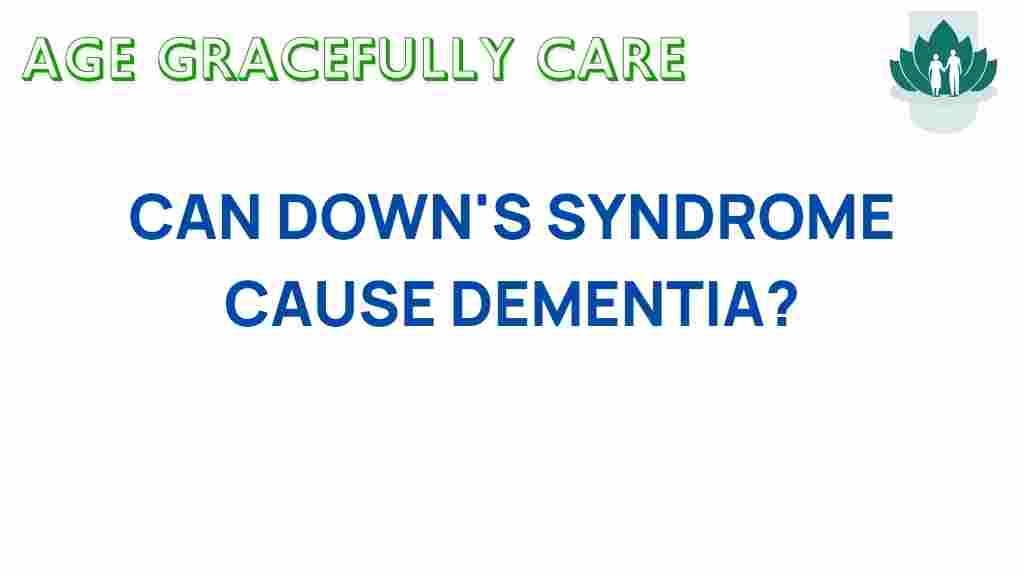Unraveling the Link: Can Down’s Syndrome Lead to Dementia?
Down’s Syndrome, a genetic condition resulting from the presence of an extra chromosome 21, has far-reaching implications on health and development. One of the critical concerns for individuals with Down’s Syndrome is the potential for cognitive decline and the development of dementia as they age. Understanding the connection between Down’s Syndrome and dementia is crucial to raising awareness and providing appropriate support for affected individuals and their families.
Understanding Down’s Syndrome
Down’s Syndrome is characterized by a variety of physical and cognitive challenges. Individuals with this condition often exhibit:
- Distinct physical features, such as a flat facial profile and slanted eyes.
- Developmental delays and varying levels of intellectual disability.
- Increased risk of certain health issues, including heart defects and gastrointestinal problems.
Despite these challenges, many individuals with Down’s Syndrome lead fulfilling lives. However, as they age, the risk of developing neurological conditions, including dementia, increases significantly.
The Link Between Down’s Syndrome and Dementia
Research suggests a strong correlation between Down’s Syndrome and the early onset of dementia. Individuals with Down’s Syndrome are at a higher risk for developing Alzheimer’s disease, a common form of dementia. Here are some reasons behind this connection:
- Genetics: The genetic makeup of individuals with Down’s Syndrome predisposes them to develop amyloid plaques in the brain, which are associated with Alzheimer’s disease.
- Cognitive Decline: Many individuals with Down’s Syndrome experience cognitive decline as they age, which can mimic the symptoms of dementia.
- Aging: As life expectancy increases for individuals with Down’s Syndrome, aging becomes a significant factor in health deterioration, including cognitive health.
Cognitive Decline in Down’s Syndrome
Cognitive decline in individuals with Down’s Syndrome can manifest in several ways, including:
- Memory loss
- Difficulty with problem-solving and planning
- Changes in mood or behavior
- Challenges in communication
These symptoms can be distressing not only for the individuals affected but also for their families and caregivers. Recognizing these signs early can facilitate timely interventions and support.
How Aging Affects Individuals with Down’s Syndrome
Aging is a natural process that impacts everyone, but for individuals with Down’s Syndrome, the effects can be more pronounced. Some key aspects to consider include:
- Increased Health Risks: Aging individuals with Down’s Syndrome are more susceptible to various health issues, which can exacerbate cognitive decline.
- Social Isolation: As health declines, individuals may become more isolated, leading to increased feelings of loneliness and depression.
- Need for Support: Families and caregivers may need to adapt their support systems as individuals with Down’s Syndrome age.
Acknowledging the Risk of Dementia
Awareness of the risk of dementia in individuals with Down’s Syndrome is essential. Families and caregivers should be informed about the signs of dementia, which include:
- Forgetfulness
- Difficulty concentrating
- Confusion about time and place
- Personality changes
Educating caregivers and families about these symptoms can help in seeking timely medical advice and support. You can learn more about dementia and its symptoms through resources available at Alzheimer’s Association.
Supporting Individuals with Down’s Syndrome
Support is crucial for individuals with Down’s Syndrome, especially as they age. Here are some strategies to enhance their quality of life:
- Regular Health Check-ups: Frequent medical evaluations can help monitor overall health and detect early signs of cognitive decline.
- Engagement in Activities: Encourage participation in social, physical, and cognitive activities to keep the mind and body active.
- Creating a Supportive Environment: A safe and nurturing environment can help reduce anxiety and promote well-being.
Step-by-Step Process for Families and Caregivers
To effectively support individuals with Down’s Syndrome as they age, families and caregivers can follow this step-by-step process:
- Educate Yourself: Learn about Down’s Syndrome, dementia, and cognitive decline. This knowledge will empower you to provide better support.
- Monitor Health: Keep track of any changes in behavior or cognition. Regular check-ups with healthcare professionals are essential.
- Encourage Independence: Promote autonomy by allowing individuals to make choices about their daily routines.
- Foster Social Connections: Help them maintain relationships with friends and family to combat isolation.
- Access Resources: Utilize available resources for support, including local organizations and online communities.
Troubleshooting Tips for Caregivers
Caregiving can be challenging, especially when dealing with cognitive decline. Here are some troubleshooting tips:
- Establish Routines: Consistent daily routines can provide a sense of security and familiarity.
- Use Visual Aids: Visual reminders can help with memory and daily tasks.
- Practice Patience: Cognitive decline can lead to frustration; remaining patient and calm is essential.
- Seek Support Groups: Connecting with other caregivers can provide emotional support and practical advice.
Conclusion
Understanding the connection between Down’s Syndrome and dementia is vital for providing the necessary support and resources for affected individuals and their families. As research continues to unfold, increasing awareness about the risks associated with aging and cognitive decline in individuals with Down’s Syndrome is essential. By fostering a supportive environment and recognizing the signs of dementia early, caregivers and families can help enhance the quality of life for those with Down’s Syndrome. Together, we can work toward a more informed and compassionate approach to health and well-being for individuals facing these challenges.
For more information and support, consider visiting additional resources tailored for individuals with Down’s Syndrome and their families.
This article is in the category Health and created by AgeGracefullyCare Team
